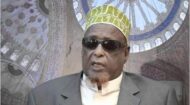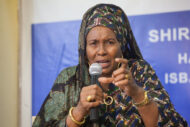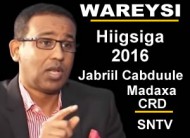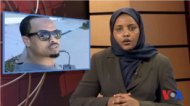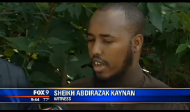A supporter of presidential candidate Ahmed Shafiq, the last prime minister of ousted leader Hosni Mubarak, holds his image as she demonstrates in Nasr city on the outskirts of Cairo, on June 23, 2012. Tensions soared in Egypt a day before the result of a divisive presidential election and as the Muslim Brotherhood sparred with the ruling generals over what it sees as a military power grab. Getty
Cairo(BNA) Government Sources claimed that Egypt`s electoral body would announce Ahmed Shafiq as the country`s new president on Sunday Western diplomats in Cairo also said they have heard similar predictions from Cabinet members over the last three days.
A source in the current government told Ahram Online that Ahmed Shafiq would be declared winner with 50.7 per cent of the vote, in an outcome that is likely to be strongly disputed by the Muslim Brotherhood`s candidate, Mohamed Mursi.
Mursi`s campaign has previously shrugged off Shafiq`s claims of a victory, insisting they have compiled strong evidence to the contrary.
Sources at the Supreme Presidential Electoral Commission (SPEC) would not confirm to Ahram Online the claims of a Shafiq win.
© 2012 Bahrain News Agency . All Rights Reserved
Saudi analyst blames Muslim Brotherhood for ongoing political chaos in Egypt
BBC Monitoring Middle East
June 23, 2012
At 1927 gmt on 20 June, Riyadh Al-Ikhbariyah Satellite Channel in Arabic broadcasts its talk show “The World Through Saudi Eyes” to discuss the outcomes of an early-win declaration made by the Muslim Brotherhood`s presidential campaign as the Supreme Presidential Electoral Commission (SPEC) delays the run-off results to 24 June. Anchorman Abdallah al-Harithi interviews Mahmud Nafadi, deputy chief editor of the Al-Jumhuriyah newspaper, and Ibrahim al-Nahhas, Saudi professor of political science at King Saud University.
The programme hosts says that an “atmosphere of chaos” looms in Egypt following the order of the ruling Supreme Council of the Armed Forces (SCAF) to dissolve the Islamist-dominated parliament pursuant to an order of the country`s Constitutional Court. Noting the presidential elections, he asks Mahmud Nafadi to opine about both candidates claiming victory based on unofficial results. Nafadi accuses Muslim Brotherhood candidate Muhammad Mursi of causing “political chaos” after he appeared in a press conference to claim victory before the vote count was done. Nafadi expresses his surprise to see Mursi challenging the election “he claims to have won.” He adds that not until SPEC announces the final results can Egypt then declare one of the two candidates the official winner. “A president cannot rule Egypt by just giving imaginary numbers,” concludes Nafadi. Political futility
The programme host interviews Ibrahim al-Nahhas. Regarding the SPEC adjournment to announce the run-off results, which allows both candidates to claim victory, Al-Nahhas says that the whole scene reflects the “political futility” of the two rival candidates, especially that of the Muslim Brotherhood. He further says that claiming victory based on unofficial results is illegal and that Muhammad Mursi`s campaign “should appear before the court because of that.” He explains that such early-win declarations can cause political turmoil and eventually “blackmail the Egyptians inside the country and the people who watch the situation from outside.”
The Muslim Brotherhood, according to Al-Nahhas, “lacks political experience despite its long history dating back to 1928. The movement did not benefit from the tough experience it faced during Egypt`s royal and Nasserite stages [referring to former Egyptian President Jamal Abd-al-Nasir].” He fears thatEgypt will experience large-scale political chaos if the Muslim Brotherhood claims power. “The movement does not respect the other`s opinion and wants to exclusively seize power for itself,” explains Al-Nahhas.
However, he reiterates that he is not against the movement but he criticizes any conduct that would wreak havoc in the country. “The wise people ofEgypt should stand firm against such people and should not yield to the emotional calls and banners of the Muslim Brotherhood or anyone else,” adds Al-Nahhas. He says that the movement tries to portray itself as “Muslim” while the other parties are not. He says: “There are some people, like the Muslim Brotherhood, who use Islam for political purposes, while some others attempt to practice Islam in its moderate manners.” Egypt`s SCAF: Soft coup?
Both Mahmud Nafadi and Ibrahim al-Nahhas express their confidence that the SCAF has not seized power amid the current events in Egypt but acts to maintain stability in the country. The two guests also believe that holding a million-man rally in Tahrir Square on Friday 22 June – to reject the constitutional declaration and SPEC`s delayed announcement of the run-off results – should not represent any danger as long as the Egyptians enjoy a “great spirit of understanding,” according to al-Nahhas. The latter, at the end of the talk show, urges the Muslim Brotherhood leadership to favour wisdom and public interest, and to consider that some external powers, like “Israel andIran,” have ambitions in the entire region.
© 2012 The British Broadcasting Corporation. All Rights Reserved.
In Egypt, Hints of an Accord Between Muslim Brotherhood and the Generals
By DAVID D. KIRKPATRICK
NYTimes.com Feed
June 24, 2012
CAIRO — The commission overseeing Egypt`s first competitive presidential election will declare an official winner on Sunday, the panel said Saturday, amid growing conviction that the announcement has become a bargaining chip in a negotiation for power between the ruling generals and the Muslim Brotherhood.
“As the beginning of a transition to democracy, it is a disaster,” said Omar Ashour, a political scientist at the University of Exeter and the Brookings DohaCenter, who is here in Cairo. But, he added, the disaster began the day before the presidential runoff, when the military dissolved the Brotherhood-led Parliament and seized legislative power.
“The generals have their fingers on the reset button if they don`t like the outcome,” Mr. Ashour said. While the Brotherhood may have more legitimacy and the ability to bring hundreds of thousands into the streets, “the generals have the guns and tanks and armored vehicles,” he said. “We are playing realpolitik at the moment.”
Television talk shows have obsessed over fragmentary reports of conversations between Brotherhood leaders and the ruling generals, mainly a face-to-face meeting last weekend between the Brotherhood`s parliamentary leader, Saad el-Katatni, and Gen. Sami Hafez Enan. But a Brotherhood spokesman, Jihad el-Haddad, said Saturday that there had been no direct meetings since then, when the Brotherhood made its demands for the reinstatement of Parliament and the empowerment of an elected president.
What is more, he said, the Brotherhood agreed Friday that from now on any talks with the generals would be conducted by a new “national front” it had formed with more secular or liberal advocates of democracy. In so doing, the Brotherhood is acceding to arguments for greater collaboration and openness that have been for years advanced by its more liberal leaders.
Mr. Haddad also insisted that the announcement of a president was merely a first step toward the resolution of the standoff, adding that thousands of Brotherhood members and their allies have once again occupied Tahrir Squarein Cairo. “The governing will within the national front is that there will be no meeting with SCAF unless there is an elected president,” he said, referring to the Supreme Council of the Armed Forces.
He acknowledged, though, that most Egyptians now believed that the weeklong delay in the announcement had turned the declaration of a president into a bargaining chip in the generals` indirect negotiations with the Brotherhood and its new allies.
The members of the commission of judges overseeing the vote — all appointed by former President Hosni Mubarak — have said they delayed the announcement of the official results to investigate allegations of fraud from both sides. But the delay is a tacit threat to the Brotherhood, whose candidate, Mohamed Morsi, appeared to be the winner with 52 percent of the vote. His opponent, Ahmed Shafik, a former air force general and Mr. Mubarak`s last prime minister, has also declared himself the winner.
Both the Brotherhood and the generals have been fairly open about their bargaining positions. Indeed, the two sides appeared to have reached a rough accord on power-sharing just a few months ago, before it disintegrated in angry disputes over the transitional government and presidential elections.
“Now each side feels like the other did not live up to its end of the agreement,” said Michael Hanna, a researcher at the Century Foundation inNew York. “The problem now is overcoming these accumulated suspicions.”
The Brotherhood`s leaders say their chief demand is the recognition of their victories in the parliamentary and presidential elections. They pointedly say that they respect a ruling on June 14 by the Supreme Constitutional Court that the military used as a writ to dissolve Parliament: that political parties were wrongly allowed to run parliamentary candidates competing for the one-third of seats set aside for individuals rather than party lists. But instead of the immediate dissolution of the whole legislature, the Brotherhood proposes new elections for those seats or perhaps accelerated elections for the whole chamber.
The Brotherhood also demands that the military council roll back the provisions of its interim charter stripping the incoming president of almost all of his power and making him largely dependent on the military council. “This would at least solve 75 percent of the problems we find with the decree, which gives the military council a veto over everything,” Khairat el-Shater, the Brotherhood`s chief strategist, told Reuters.
Since seizing power after Mr. Mubarak`s ouster, the generals, for their part, have appeared focused primarily on a new constitution that could protect their power, their privilege and perhaps the generally secular character of the state. “The constitution is their biggest priority,” Mr. Hanna said. “It gives them a way to protect themselves, a legal shield.”
Under the old military-backed autocracy, top military leaders enjoyed nearly total autonomy and immunity from oversight, and they were allowed to build their own commercial empire far outside the defense industry. And in public statements the generals have repeatedly said they expect to preserve their empire and their autonomy within any new civilian government.
The generals have repeatedly rearranged the transitional timetables to ensure that the Constitution is written while they remain in power, and they have tried to insert specific provisions to protect their power and immunity.
And as recently as a few weeks ago, Field Marshal Mohamed Hussein Tantawi, the leader of the military council, said cryptically that the generals did not intend to leave power until a constitution was complete, even though the slow-starting constitutional assembly had no chance to finish before the generals pledged transfer of power on June 30. Now that the generals have renewed their hold on power, Mr. Hanna said, his meaning may be clearer.
Until the spring, the two sides seemed to have reached a rough agreement to ease the generals from power. Brotherhood leaders have said consistently that they expected, for at least the near term, only limited public scrutiny of the defense budget, working with the generals to manage defense matters, protecting them from criminal prosecution over events in the past and the continuation of their commercial empire.
The breakup appeared to begin when Parliament sought to replace the military`s prime minister and the generals refused. Evidently taking a cue from the generals, the bureaucracy — including the election commission — and the state news media grew more critical of the Brotherhood as the group grew more assertive.
The Brotherhood broke its promise not to run a presidential candidate, and the judges of the election commission blocked its first choice, Mr. Shater. The Brotherhood sought to dominate a constitutional assembly, and the court struck it down. And the standoff culminated in the parliamentary dissolution.
Now it is unclear if the two sides can return to their earlier accord, in part because neither one trusts the other. The generals said last week that they would give no ground on the shutdown of Parliament or on their interim constitution until the completion of a permanent charter.
Mr. Haddad, of the Brotherhood, said it, too, was digging in for a long fight. “We are prepared logistically to stay as long as we need to in Tahrir Square,” he said of the five-day old encampment there. “We have supply lines, coming in and out of Tahrir Square, so it is designed for a long stay.”
© Copyright 2012. The New York Times Company. All Rights Reserved.
$200M U.S. Tax Dollars Invested In Muslim Brotherhood & Salafists in Egypt
The Independent Sentinel
December 04, 2011
Leon Panetta said on Friday that it is too soon to determine the outcome of the Egyptian elections. He should tell that to the interim government of Egyptwhich made it clear that the young liberation rebels lost big and the prize goes to the Muslim Brotherhood first and the Salafis second.
The Islamic fundamentalist Muslim Brotherhood`s Freedom and Justice Party garnered 36.6 percent of the 9.7 million valid ballots cast last week for party lists. The Nour Party, representing the more hard-line Salafi Islamists, captured 24.4 percent. The liberal Egyptian Bloc – which came in third with 13.4 percent of the votes – could counterbalance hard-line elements.
The tallies offer only a partial indication of how the new parliament will look. There are still two more rounds of voting in 18 of the country`s 27 provinces over the coming month and runoff elections on Monday and Tuesday to determine almost all of the seats allocated for individuals in the first round.
The position of Islamists is set. They will be in power as will Shari`ah Law with all its servitude of women and banning of anything fun, such as dancing and alcohol. The Salafis are already questioning whether women should be allowed to drive.
We now have a fairly strict religious state rising out of the ashes, one in whichShari`ah Law will be the law of the land, but they didn`t do it without help.
Newsmax reported: They had the $200 million Obama gave them for democracy building. Another wasteful expenditure of U.S. tax dollars. With 65 percent of the vote going to Islamist candidates, it doesn`t appear the money was well spent.
Stephen McInerney, executive director of the Project on Middle East Democracy, told Campaigns & Elections magazine that $65 million went to Egypt after the uprising that toppled President Hosni Mubarak and an additional $100 million was earmarked for economic development but also to train Egypt`s nascent political parties.
The money is going through the State Department, the U.S. Agency for International Development (USAID), the International Republican Institute and the National Democratic Institute.

 All Posts
All Posts


